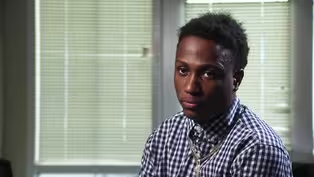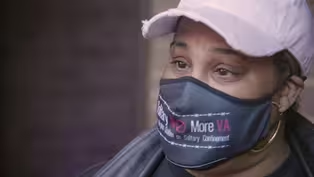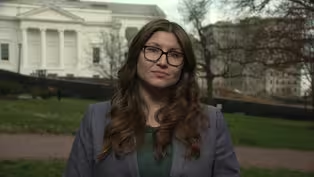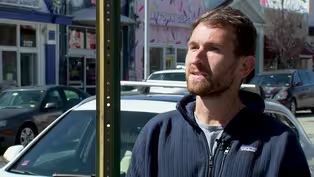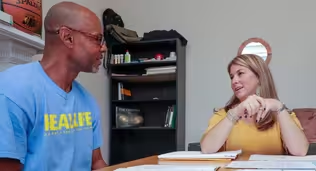VPM News Focal Point
Justice Reform | March 10, 2022
Season 1 Episode 3 | 26m 46sVideo has Closed Captions
Explore how activists work to reform Virginia's criminal justice system.
Activists say solitary confinement is a human rights violation; how is the practice applied in Virginia prisons? Observe the state’s only youth prison before it closes and learn about creative solutions to reducing recidivism in Richmond.
Problems playing video? | Closed Captioning Feedback
Problems playing video? | Closed Captioning Feedback
VPM News Focal Point is a local public television program presented by VPM
The Estate of Mrs. Ann Lee Saunders Brown & Dominion Energy
VPM News Focal Point
Justice Reform | March 10, 2022
Season 1 Episode 3 | 26m 46sVideo has Closed Captions
Activists say solitary confinement is a human rights violation; how is the practice applied in Virginia prisons? Observe the state’s only youth prison before it closes and learn about creative solutions to reducing recidivism in Richmond.
Problems playing video? | Closed Captioning Feedback
How to Watch VPM News Focal Point
VPM News Focal Point is available to stream on pbs.org and the free PBS App, available on iPhone, Apple TV, Android TV, Android smartphones, Amazon Fire TV, Amazon Fire Tablet, Roku, Samsung Smart TV, and Vizio.
Providing Support for PBS.org
Learn Moreabout PBS online sponsorship>>Angie Miles: Virginia has only one juvenile correctional center left.
Some say that's one too many and they see closing it as a step towards fixing juvenile justice in our state.
Solitary confinement in Virginia, some are fighting to end it, while others say "We don't even have it."
We'll hear from people who spent months or even years in isolation.
And learn about people who've served their time, now getting real help to create the lives they want.
Production funding for VPM News Focal Point is provided by Dominion Energy, dedicated to reliably delivering clean and renewable energy throughout Virginia Dominion Energy Actions Speak Louder The estate of Mrs. Ann Lee Saunders Brown and by ♪ ♪ Angie Miles: Thank you for joining us for "VPM News Focal Point," I'm Angie Miles.
In this program, we explore what justice means in Virginia.
We'll focus on the issue of solitary confinement, explore efforts to reform the juvenile justice system and meet a woman who helps formally incarcerated people to get a fresh start.
First, here's a snapshot of stories from around the state.
In Virginia Beach, a rally drew hundreds to the ocean front boardwalk over the weekend to show support for Ukraine.
The event was organized by Ukrainian born Valentyna Sonmezler, whose mother and relatives remain in Ukraine.
As Russia continues its violent advance, at least 2 million Ukrainians have fled their country.
In Northern Virginia, a convoy of vehicles stretched for miles around he Beltway earlier this week.
The People's Convoy is protesting COVID-19 mask and vaccine mandates.
The massive demonstration originated in California a week ago and was inspired by a similar demonstration in Canada.
In Henrico, Congressman Donald McEachin has announced the bipartisan African American Burial Ground Preservation Act, to provide funds for the upkeep of historic Black cemeteries.
Funding through the National Park Service will provide grants.
In Fairfax, a first grade teacher is boosting her pupils fine motor skills with a shoe lace tying classroom challenge.
Christine Jarboe says for many children, fine motor skills have declined during the pandemic.
She says this is a practical skill that her students enjoy practicing and earns them a chance to win a pair of neon shoelaces.
♪ >>Miles: As Virginia's General Assembly session winds down, VPM News legal reporter Whittney Evans brings us the latest update.
Whittney, what legis- lation made waves this week?
>>Whittney Evans: Thanks, Angie.
We're watching the budget, of course, as negotiations unfold this week and wrap up.
But I want to turn the focus to some proposals that VPM's been following this year that failed this session.
One is a proposal that Republicans in the House killed this week.
It would have required state agencies in Virginia to first consult with Native American tribes before moving forward with any projects that would affect them.
And advocates said, you know, this is a way to recognize their sovereignty.
The bill got full support in the Senate unanimous support, but didn't make it through a House committee.
Also, criminal justice bills.
There were plenty of proposals introduced at the beginning of the session that didn't make it make it this far.
Republicans introduced a bill that would reinstate the death penalty one year after Democrats abolished the practice.
Another bill, sponsored by a Republican, would give power back to police officers to stop drivers for relatively minor infractions, like a busted tail light.
And you can't talk about criminal justice issues without talking about marijuana.
The Legislature failed to pass a comprehensive marijuana reform package, which included numerous criminal justice implications.
Angie.
>>Miles: Whittney, you mentioned budget negotiations.
You've been looking into some of the tax proposals.
What can you tell us about those bills and how they might affect Virginians?
>>Evans: So lawmakers in the House and Senate want to get money back into the pockets of Virginia taxpayers by way of rebates.
And the House has a proposal that would provide for a $300 rebate for individual taxpayers and a $600 rebate for married couples.
The Senate has a more modest proposal.
$250 rebate for individuals and a $500 rebate for married couples.
Governor Glenn Youngkin supports the House version, but he'll have a chance in the in the coming weeks to to go back and amend whatever budget lawmakers get passed this week.
>>Miles: Thank you, Whittney.
That's our Whittney Evans reporting.
You can find more coverage at vpm.org/focalpoint For some Virginians, getting pulled over for a speeding ticket is their only interaction with law enforcement.
For others, interactions with the courts and the criminal justice system are a regular part of life.
What do Virginians think about our criminal justice system?
Keyris Manzanares sheds some light in our People of Virginia segment, Keyris.
>>Keyris Manzanares: Thanks Angie, the word justice covers a wide array of people and systems, from police to the courts to jails and prisons.
We wanted to hear from people in the Commonwealth about what they think is working well and what needs improvement in Virginia's justice system.
When I think of criminal justice reform, I think of creating a system in which punishments fit the crime.
>>Stephanie Rasinski: I feel like if there has to be a prison system, I think paying people fairly while they're within that system so that when they leave, they are able to actually do something.
>>Kayen Wilborn: Those that are on the spectrum or those are - that have special needs or disorders.
You know, I think there needs to be more, more attention to not necessarily putting those kids in juvenile detention or in those solitary confinement situations.
>>Manzanares: We appreciate those answers and the feedback we've received on our other topics so far.
We'd like to hear from you.
After you watch today's stories, please share your thoughts on our website at vpm.org/focalpoint, Angie.
>>Miles: Thank you Keyris.
Bon Air Juvenile Correctional Center is Virginia's last youth prison.
Located in Chesterfield, it can house up to 284 young men between the ages of 14 and 20.
Youth incarceration has declined in Virginia as it has across the nation.
A recent report highlighted problems within the state's juvenile justice system.
Advocates say young people don't belong in prison and argue it's time to close Bon Air Correctional.
>>Keyris Manzanares: A recent report from Virginia's nonpartisan watchdog agency highlighted racial disparities and ineffective rehabilitative programs, within the juvenile justice system.
It also recommended downsizing Bon Air Correctional Center, the state's only youth prison.
>>Valerie Slater: How do we do juvenile justice?
>>Manzanares: Valerie Slater, executive director of the advocacy group, Rise For Youth, says she learned nothing new from the report.
Its findings mirror what advocates have said for years.
>>Slater: We know that it's Black and brown kids that end up in DJJ.
And it's their white counterparts that are diverted more often.
We know that.
We know that there are particular communities that are under-resourced at such astronomical rates, that being incarcerated seems like a way out for some kids.
>>Manzanares: When it comes to Bon Air Correctional, Slater says it needs to go.
>>Slater: It's definitely time for Bon Air to close.
It's time for us to get away from the old adult prison modeled facilities, and to focus our attentions and our energies on creating small rehabilitative spaces for children.
>>Ashley Diaz Mejias: It's not exactly the same, but it has a similar feeling.
>>Manzanares: Reverend Ashley Diaz Mejias is a part of Voices of Jubilee, a worshiping community that volunteers at Bon Air Correctional.
>>Diaz Mejias: The setup of the prison is really similar to a high level adult facility.
It has kind of the spider setup.
You see only concrete walls, the basketball courts are completely enclosed.
>>Manzanares: Having one main youth prison in the state, also means that kids are further away from their communities.
Between 2017 and 2020, nearly half of the youth incarcerated under D-J-J were from the eastern region.
>>Raequan Miller: It opens up a bigger future of being in this system.
>>Manzanares: Raequan Miller, who lives in Hampton Roads experienced this firsthand.
His interactions with Virginia's Juvenile Justice System started after he made a prank call to his fire department.
>>Miller: I was 12 years old and they put me on house arrest, this is my first time on house arrest, I'm like, what am I supposed to do now?
I'm 12.
12 year olds go outside, they play.
>>Manzanares: The incident upended Miller's life and changed how he was perceived in the eyes of the law.
>>Miller: If I go in the courtroom, I already have a history of being a delinquent and doing bad things.
>>Manzanares: In 2018, Miller pleaded guilty to a state issued sexual battery charge.
Miller's public defender told him to plead guilty, even though the state had evidence that would have proven his innocence.
>>Miller: I got sentenced to Bon Air, for seven to 10 months.
I went to Bon Air, Bon Air was childish.
Like it wasn't a learning experience not to go to jail again.
Like it was just like a daycare.
I was just locked up, I just couldn't go home.
>>Manzanares: The D-J-J's approach to rehabilitation for youth at Bon Air Correctional follows a Community Treatment Model.
Miller says it doesn't work.
>>Miller: It doesn't hold children accountable for either what they did or what they was accused of.
And it doesn't put them in a setting of, when I go home I want to change, or I want to do this differently.
>>Manzanares: Diaz Mejias says the youth at Bon Air Correctional have been swept into a system where they never stood a chance.
>>Incarceration does not solve our violence problem.
It does not make us safer.
It has not done much for us other than just create this behemoth of a prison industrial complex.
>>Manzanares: Virginia's Department of Juvenile Justice declined multiple requests for interviews with director Amy Floriano and others who work closely with Bon Air Correctional Center.
Reporting for VPM News Focal Point, I'm Keyris Manzanares.
>>Miles: A representative from Virginia's Department of Juvenile Justice, said the agency's new director Amy Floriano, did not feel she was in a position to provide a meaningful interview in response to the contents of the JLARC study.
♪ >>Miles: Virginia lawmakers said, "no," this year to outlawing prolonged solitary confinement.
Increasingly experts, advocates and many Virginians have condemned the practice of housing prisoners in isolation for extended periods of time.
But for a second consecutive year, lawmakers voted not to ban solitary.
Instead a House subcommittee referred the question for further study to the very department that activists accuse of overusing solitary confinement.
>>Angie Miles: In the scenic rolling hills of Virginia are two of the most notorious prisons in the country.
Wallens Ridge and nearby Red Onion are "supermax" facilities operated by the Virginia Department of Corrections.
Intended for the worst, most dangerous offenders.
Demario Tyler served three years.
The last of it at Wallens Ridge.
>>Demario Tyler has never met Natasha White, but she is one of his defenders.
White spent time in prison outside of Virginia and she is the coordinator of a statewide coalition of lawyers, faith leaders, and civil rights advocates working for laws against long term solitary confinement.
>>Natasha White: Good morning.
We're trying to pass a bill in Virginia to end long term confinement in... >>Miles: Solitary confinement is keeping a person isolated in a cell that can be as small as a parking space most or all of each day deprived of meaningful interaction with others.
White is part of a growing movement to limit or eliminate solitary confinement.
>>White: Thank you.
You have a nice day.
So I was in solitary confinement for a total of four years.
However my husband was also in solitary confinement for 12 years.
And the impact it had on him when he came home is the reason I do this.
He couldn't function in a normal busy environment.
How do you handle that when you've been with somebody for 20 years and they come home totally traumatized with natural life?
>>David Smith: I spent 16 and a half months in solitary confinement.
I got out twice a week for a five minute shower, and then once every other week for a one hour time of rec time by myself.
It basically tore me mentally down.
And I saw people around me that suffered so much worse than I did.
There are people that would lay in bed all day.
Not even get up to use the toilet.
>>Miles: Coalition Chair David Smith is describing a Virginia jail which is not operated by Virginia's prison system.
But his description is consistent with experiences shared by jail and prison inmates all over the country.
Solitary, isolation, segregation, restricted housing, all names for what prisoners call being "in the hole."
In 2011, the United Nations ruled solitary confinement amounts to torture and should be banned in most cases.
Symptoms like headaches, delusions, and suicidal thoughts can set in after just a few days.
But some in America's jails and prisons are held in isolation for weeks, months, or years.
In Virginia, one of the most publicized cases is that of Tyquine Lee.
In isolation for nearly two years at the end of which his mother says he had lost 30 pounds and was unable to speak except in barks, growls, and numbers.
>>White: The purpose of corrections is just that.
To deal with the underlying issue of why people are committing crimes.
Not to make them into people that can't take care of themselves.
>>Miles: When comparing prisoners who experience solitary and those who never did, multiple studies correlate any time spent in isolation with increased risk of self harm, suicide, and early death.
Also higher unemployment and likelihood of repeat offenses.
Looking at a study from UNC Chapel Hill, those who spent time in solitary are 127% more likely to die of an opioid overdose within two weeks of leaving prison.
>>White: You should not be defined by the worst mistake you ever made in your life.
I don't care what it is.
We've all made mistakes.
But you cannot say you're truly a good person if you're willing to torture other people.
If you have human moral standards, and you're compassionate towards other human beings, then you will agree that solitary confinement needs to go.
>>So, we want to reduce the use of solitary confinement in Virginia.
>>Miles: Religious leaders from numerous faiths have held news conferences and prayer vigils.
>>Miranda Elliott Rader: To keep people in solitary confinement for more than just a few days is literally torturing people, definitionally torture, and we could end that practice.
Just chipping away at the cruelties that we've constructed for each other.
>>Miles: Virginia's Department of Corrections has one of the lowest recidivism rates in the country.
Meaning that those who serve time tend not to re-offend and return to prison.
VDOC has also earned awards and praise for progressive education and reentry programs.
But what about solitary confinement?
>>Lois Fegan: No, the term you mentioned doesn't apply here.
So our program... >>Miles: This brings us to the debate over the definition of solitary confinement, which for some is merely an exercise in semantics.
There is a general consensus among reputable health and human rights organizations that solitary confinement is 22 or more hours in isolation without meaningful human contact.
But Virginia's prisons claim inmates only spend 20 hours per day in isolation.
That's a two hour difference.
>>Fegan: So our program actually goes above and beyond that because we offer at least four hours every day of meaningful, structured/unstructured programming for all the inmates that are in this specialized secure pod.
So our program was called restrictive housing and now we've called it restorative housing.
>>Miles: The prisoner's rights community calls the distinction between 20 hours and 22 hours meaningless, especially if time outside the cell is also spent in isolation.
Legislation that advocates have proposed for Virginia say every inmate is entitled to at least four hours of meaningful interaction outside of a cell.
And if solitary confinement should be necessary for extreme situations, not minor infractions, it should last no more than 15 days.
>>Fegan: But just to reiterate that we do offer the most progressive program in the country of opportunities, programs, and pathways for every single inmate that's in our care, but particularly the ones that come to us in sort of a crisis.
Whether it be a difficult situation, a behavioral issue.
>>Miles: Demario Tyler has been in crisis his whole life.
This is the crime that landed him in prison.
He broke into two restaurants in 2016 looking for money or food.
Before that, he'd spent more than 10 years in foster care.
His mother died when he was 10.
His autobiography is painted in shades of anger, frustration, sadness, and worry in the letters he's written from prison over several years.
In 2019, The Washington Post featured excerpts of Tyler's letters without using his name.
He wrote "It's taking all the mental power I have to cope here."
"These people make me want to hurt them one minute due to the treatment I'm receiving, and the next minute I want to hurt myself."
>>Miles: Tyler finished his time at Wallens Ridge in 2020, but is now re-incarcerated in Hampton on new charges.
Those stem from when he called police to stop him from trying to kill himself.
Six months after his release from Wallens Ridge.
While at Wallens Ridge, Tyler's way out of isolation was the Prison Step Down Program.
Through which inmates earn their way back to general population.
Step Down is a prized element of what VDOC calls restorative housing.
>>Fegan: The core component of the program is called interactive journaling.
And so the inmates have the opportunity to do it together with other people in the restorative housing program.
>>Miles: The American Civil Liberties Union has filed a class action suit to end the Step Down program.
They allege that the program in practice is arbitrary, sometimes retaliatory, and mostly a ruse to keep inmates in solitary confinement indefinitely.
Do you feel comfortable saying everyone who's incarcerated in Virginia's prison system is treated humanely?
No issues with people being placed in a restorative housing or segregated situation against their will if that individual does not pose a real threat to the institution?
>>Fegan: I'm comfortable saying that.
I feel that all the inmates in our system are treated humanely and fairly with respect and with compassion.
And again our whole mission, you can see it on the wall here in this building, is we're in the business of helping people be better.
>>Miles: Letters and calls from inmates and family members allege that restorative housing and the Step Down program don't work the way administration describes.
>>White: As a formerly incarcerated woman I know that the issues that surround incarceration are not for me if they don't involve me.
I'm the only one that can tell you the truth.
>>Miles: To some, people convicted of crimes deserve whatever happens to them.
It's also true that people serving time can have credibility issues when they make accusations of mistreatment.
White says ending solitary confinement should be less about prisoners' credibility and more about our regard for basic human rights.
>>Miles: The Virginia Department of Corrections is charged with reporting on its solitary confinement study later this year.
Critics say the Department needs effective and objective oversight, instead of being allowed to investigate itself.
Demario Tyler expects to be released from jail next month.
He says, he's looking forward to getting a job, and a counselor and never going to jail or prison again.
♪ >>Miles: In this week's spot- light meet Dr. Sarah Scarbrough, the founder of a Richmond program called, REAL LIFE.
REAL LIFE helps people make real changes to overcome challenges they face after being released from correctional facilities.
The program helps people find housing, jobs and hope after incarceration, opening a path to a new way of life.
When your other three sets of bunks come (metal slapping) it's all pieces.
>>Sarah Scarbrough: I grew up in a law enforcement household and my dad's been in law enforcement, his whole life, my whole life.
So I grew up with, I guess criminal justice running through my blood.
>>This is connected.
>>There you go.
>>Scarbrough: I went into the jail in 2008 as a researcher, working on my research for my dissertation, for my PhD at VCU.
And so, after I graduated, I just kept on going back to jail.
>>Thomas Young: I believe in her, I believe in what she brings to the table.
She's real.
And everything she touches seems to work.
I've seen her change people's lives.
>>Marlon Jackson: She told my counselor, she said, "Oh no."
She said, "Oh no, he's not going to no street.
He's gonna come to REAL LIFE."
>>Young: I've seen her implement programs that matter.
>>Jackson: And we are gonna work with him.
I don't care how long he been down.
I don't care what he done done.
>>Scarbrough: The program in the jail was called the 'REAL' program.
REAL: Recovering from Everyday Addictive Lifestyles, and it's actually a name that the men in the program came up with.
What I realized is while we did have great programming and research to back it and all of that, folks were getting out and still struggling and having hurdles and obstacles and some led back to their incarceration.
Other times it didn't, but it really hindered the success they could have.
So decided to start REAL LIFE in the community to help.
And the vision there was to help with some, you know bus tickets, cell phones, resume writing.
And we really realized that we needed to do more.
That's just putting a band-aid on things.
>>Jackson: And I say, thank you, thank you, thank you.
And as quick as she was telling my counselor, oh no she would say, oh no, don't tell me, thank you.
Don't say, thank you to me.
You show me what it is that you want do.
So, here I am >>Maurice Washington: Prior to coming to real life, my destination was going back to going back to prison or death.
I've seen a lot of it.
That's all I've been surrounded by my whole life.
And today I'm learning that my destination is limitless.
(metal pole chimes) >>Young: It's a lot of times there's an underlying reason why people have issues.
And once you find that root cause, and you don't have to talk just about the drugs, you can help them change themselves.
>>Washington: REAL LIFE is a family.
And it's a lot of people that that don't have, a lot of people come here don't have a family.
So it's, it's a family.
It's a network of positivity and a safe space and endless opportunity.
>>Jackson: A lifer is that individual that actually comes into this program and takes everything that this program has to offer.
And then you, I mean, you are a lifer for life and you are part of REAL LIFE for life.
>>Miles: We'd like to know what you think of the stories we shared in this episode.
Please share your opinions and dig more deeply into our reports on our website, vpm.org/focalpoint.
I'm Angie Miles.
We'll see you next time.
Production funding for VPM News Focal Point is provided by Dominion Energy, dedicated to reliably delivering clean and renewable energy throughout Virginia Dominion Energy Actions Speak Louder The estate of Mrs. Ann Lee Saunders Brown and by ♪ ♪
Advocates say to close Virginia's only youth prison
Video has Closed Captions
Clip: S1 Ep3 | 3m 57s | Bon Air Juvenile Correctional Center remains open despite incarceration trending downward (3m 57s)
The campaign to end solitary confinement in Virginia
Video has Closed Captions
Clip: S1 Ep3 | 9m 18s | Activists & faith leaders aim to end long-term isolation in Virginia prisons. (9m 18s)
Capitol In Focus: Whittney Evans
Video has Closed Captions
Clip: S1 Ep3 | 2m 26s | VPM’s legal reporter provides insight into failed bills and a potential tax rebate. (2m 26s)
Justice Reform | People of Virginia
Video has Closed Captions
Clip: S1 Ep3 | 34s | Virginians share their thoughts on criminal justice reform in the state. (34s)
REAL LIFE program founded to curb recidivism
Video has Closed Captions
Clip: S1 Ep3 | 3m 3s | REAL LIFE empowers people to overcome addictive lifestyles and avoid reincarceration. (3m 3s)
Providing Support for PBS.org
Learn Moreabout PBS online sponsorship
- News and Public Affairs

Top journalists deliver compelling original analysis of the hour's headlines.

- News and Public Affairs

FRONTLINE is investigative journalism that questions, explains and changes our world.












Support for PBS provided by:
VPM News Focal Point is a local public television program presented by VPM
The Estate of Mrs. Ann Lee Saunders Brown & Dominion Energy
